Los Angeles Area AM Radio
Stations
Listed in Chronological Order By Date of License Issued
As
Researched and Compiled by Jim Hilliker
|
|
Los Angeles Area AM Radio
Stations As
Researched and Compiled by Jim Hilliker |
|
www.theradiohistorian.org Copyright 2022 - John F. Schneider & Associates, LLC (Click on photos to enlarge) This was
the KFI studio in the Anthony building in 1924.
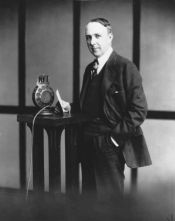 Earle C. Anthony at the KFI microphone, 1920's
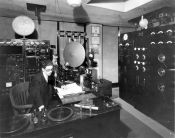 Interior viewe of the KFSG control room and transmitter in the Angelus Temple, about 1930. 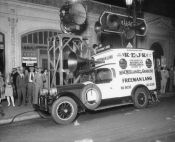 Remote broadcast vehicle of KEJK, circa 1928. The station would become KMPC in 1930. 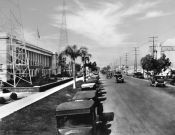 Exterior view of the KFWB towers at Warner Brothers Studios, circa 1926. 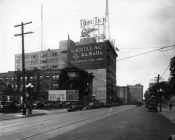 The KHJ towers atop the Don Lee Cadillac building, circa 1927. 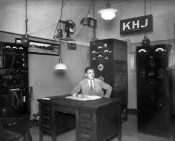 This was KHJ's 500-watt transmitter in the Don Lee Cadillac building, 1927. 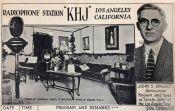 A view of the KHJ studio, with station manager and announcer "Uncle John" Daggett, about 1927. 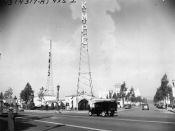 The KMPC building at 9631 Wilshire Blvd, Beverly Hills (WPA photo, 1938) 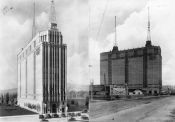 This postcard image shows two views of the KMTR towers atop the Hollywood Storage Building, 1925. 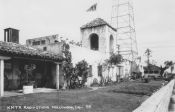 Postcard view of the KMTR (later KLAC) studios at 1522 N. La Brea in Hollywood, 1939. 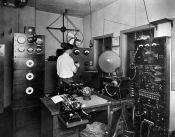 Paul O'Hana at the KNX transmitter controls, 1926. 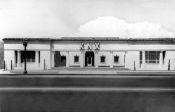 The KNX studio building on Sunset Blvd., circa 1935 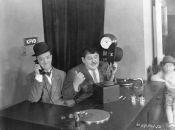 Comedians Laurel & Hardy in the studios of KFVD at the Hal Roach Motion Picture Studio 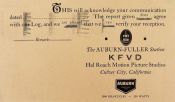 QSL card for KFVD circa 1930 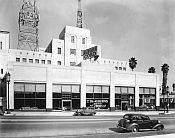 In 1936, KFAC was located in the penthouse of the E.L. Cord automobile dealership, 3443 Wilshire Blvd. 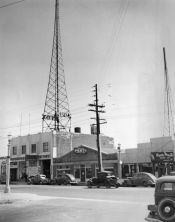 KFOX studio and transmitter, 220 Anaheim Street in Long Beach, 1938. 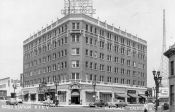 Postcard view showing the KIEV antenna and tower at the Glendale Hotel 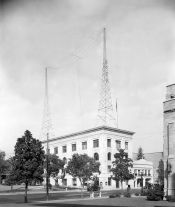 The Pasadena Star-News building, with the KPSN towers on the roof, 1925. 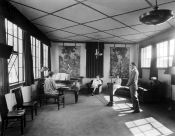 This was the main studio of KPSN in Pasadena, 1926. 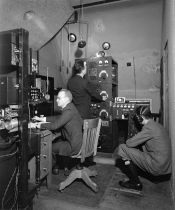 A view of the KPPC transmitter room at the Pasadena Presbyterian Church, showing the RCA 100-watt transmitter; December, 1934. |
|
NOTES ON
LOS ANGELES AREA RADIO STATIONS (Please
reference the station number in the above list to the paragraphs
below) 1.
KQL
KQL made at least one broadcast of a
wireless phonograph concert from 7:30 to 8:00 p.m. on 360 meters, on
November
1, 1921. This came from page 3, (Los
Angeles Times ad for Wiley B. Allen music store, on South Broadway,
page 3.) Arno A. Kluge died at the end of
1921. KQL was licensed October 13, 1921
until June
9, 1922. 2.
KGC began
under an amateur radio license, 6ADZ, on September 10, 1920. Its first broadcast call letters were KGC,
issued
12/8/1921. KGC changed call letters to
KNX on May 4, 1922, after moving from Hollywood to the California
Theater at
801 S. Main Street in Los Angeles. It is
the oldest radio station on the air in Los Angeles today and the
seventh oldest
radio station in the United States 3. KYJ was owned
by the Leo J. Meyberg Company, with its broadcast studio located at the
Hamburgers Department Store at 8th and Broadway in downtown
Los
Angeles. The Meyberg Company also
operated station KDN at the Fairmont Hotel in San Francisco. 4.
KZC was
operated by the Western Radio Electric Company, which had first
experimented
with broadcasting music in 1920. KZC was
licensed 12/9/1921, and quickly changed its call letters to KOG in
January of
1922. The first KOG broadcast studio was
located at the Kinema Movie Theater, Seventh and Grand in Los Angeles,
and it later
moved to the Evening Herald newspaper building. KZC
was licensed December 9, 1921 until March
9, 1923. 5.
KLB in
Pasadena was located at the J.J. Dunn battery shop, later moving to the
Pasadena Chamber of Commerce. KLB was
licensed January 4, 1922 until April 25, 1923. 6.
KGF began in
June of 1921 as an experimental wireless broadcaster to promote the
sale of
radios and radio parts at the Pomona Fixture and Wireless Company. KGF was issued its broadcasting license on
February 8, 1922, but it is unclear when the first broadcast as KGF
took
place. The earliest public mention of
the station was in April of 1922, when J.F. Rambo, owner of the Pomona
Fixture
& Wiring Company, told a local newspaper about his broadcasting
hours
fitting in with other Southern California stations on 360 meters. It maintained a schedule of weekly phonograph
concerts during much of 1922, but it had disappeared from the airwaves
in
September of that year and its license was deleted on December 31. 7. KJS first
operated with the slogan “King Jesus Saves,” but its call letters were
changed
in the summer of 1925 to KTBI, representing its station owner, The
Bible
Institute of Los Angeles. In 1931, KTBI
was sold to the Los Angeles Broadcasting Company, owned by automobile
manufacturer Errett Lobban Cord, and it became KFAC, which operated
until
January of 1989. Today, it is KWKW-1330. KJS was first licensed March 10, 1922. 8.
KGO was
located at the home of Paul Franklin Johnson in Altadena.
It soon moved to Johnson’s radio store in
Pasadena but had ceased broadcasting by August of 1923.
KGO was owned by the Altadena Radio
Laboratory from March 15, 1922 until April 21, 1923.
In
1924, the KGO call letters were reassigned to the General Electric
Company’s
new station in Oakland. 9.
KHJ was first
owned and operated by the C.R. Kierfulff Company, a radio store in Los
Angeles. They installed KHJ’s first
50-watt transmitter in the Los Angeles Times tower in April 1922, and
the
newspaper then took ownership of KHJ that October, installing a new 500
watt
Western Electric transmitter. KHJ
was licensed
March 18, 1922, and made its first broadcast on April 13, 1922. 10.
KFI was
licensed to Earle C. Anthony on March 31, 1922, and made its first
broadcast on
April 16. KFI was an original NBC
affiliate in 1927 and has been broadcasting with 50,000 watts of power
on the
clear channel frequency of 640 kHz since July of 1931.
11.
KJC was owned
and operated by the Standard Radio Company, with its equipment and
studio located
at the Barker Brothers Store in downtown Los Angeles.
KJC had disappeared from the airwaves by
October of 1922. 12.
KNR was an
irregular broadcaster operated by the Beacon Light Company. The station made at least one advertised
broadcast in 1922, but it was off the air at least four months later. 13.
KNV never
publicized a regular broadcast schedule. It
was probably only used by the Radio Supply Company to
broadcast voice
and music for short periods to demonstrate radio sets to potential
customers. The station continued
renewing its license until it was deleted on April 2, 1924. 14.
KSS in Long
Beach started in 1922 with a fairly regular schedule of daily or weekly
broadcasts. But soon the radio dealer’s
radio programs were heard less and less, and finally on an irregular
basis. This small station was deleted on
April 2, 1924. 15.
KXS in Los
Angeles was a short-lived station started by the Braun Corporation at
363 New
High Street, headed by W.B. Glasby. The
company’s early plans were to operate as an educational station
providing
information to farmers. The store
handled radio supplies and the station may have been used to advertise
the
store. KXS lasted from April 1922 until
March 1923. 16.
KZI was
licensed for just four months, from April to August in 1922, but there
is no
evidence that KZI was ever on the air. The
station’s planned purpose was to broadcast services
from The Church
of St. Albans in Hollywood at 2041 N. Argyle Ave., one block north of
Franklin. St. Albans was a new “liberal”
Catholic Church. KZI was licensed to
Irving S. Cooper, who was a bishop at the new church.
17.
KUS was established
by the Los Angeles City Dye Works and Laundry Company, at 3000 Central
Ave. in
Los Angeles. It was licensed from April
1922 until April of 1924. 18.
KWH was owned
and operated by the Los Angeles Examiner newspaper, and Bertram O.
Heller was
the chief engineer and station manager. KWH
was licensed from April 1922 until March 1925. 19.
KNN was the
“Bullock’s Radiophone,” owned and operated by Bullock’s Department
Store at
Seventh and Broadway in Los Angeles. KNN
was located in the radio department on the 5th floor. Its purpose was to advertise Bullock’s and its
new radio department, but the broadcasts included music and talks. KNN was on the air by May 11, 1922, but went
off the air in December of 1922. Its
license was deleted in June of 1923. 20.
KUY was
located in El Monte, owned by the Coast Radio Company of El Monte. It did its best to promote El Monte and its
local talent, but also advertised the radio and supplies of this radio
dealer. KUY was on the air between April
1922 and September 1924. 21.
KDYR was
licensed to the Pasadena Star-News newspaper from May 1922 until
December 1922,
but research indicates that KDYR never got on the air as planned. 22.
KDZD was
licensed to a W.R. Mitchell of Los Angeles. Radio
stations listings of the local newspapers in June of
1922 indicate
that KDZD was operated by the Los Angeles County Bible Students
Associated at
1113 Doris Street in Los Angeles. There
is no evidence that KDZD ever got on the air, but the license was
renewed twice
before being deleted in November, 1922. 23.
KDZF was owned
by the Automobile Club of Southern California. It
was probably an irregular broadcaster, as no schedules
or programs can
be found in local newspaper radio pages. KDZF
was licensed from May, 1922, until April, 1924. 24.
KDZP was licensed
by the Newberry Electric Corp. from May, 1922, until January, 1923. It was likely only on the air for advertising
purposes, such as the sale of radios to its customers.
No programs were ever listed on newspaper
radio pages. 25.
KFAC was owned
by the J.A. Newton Electric Co. and had their studio and transmitter at
the
Glendale Daily Press building. It
was
on the air between June 1922 and January 1923. (Note
that this is not the same station as KJS, which took
the call sign
KFAC in 1931.) 26.
KFAR was
licensed to the Hollywood Studio Lighting Service Co. in Hollywood,
owned by
Otto K. Oleson. The station was probably
used to promote this business, and it had an irregular broadcast
schedule,
never appearing in the newspaper radio pages. 27.
KFAV was
located at the Venice Ballroom in Venice and was licensed from July of
1922
until January 8, 1924. The first owner
was the Cooke and Chapman radio store. By
November of 1922, KFAV was owned by the Abbott Kinney
Company of
Venice. 28.
KFAW in Santa
Ana was owned by The Radio Den store, with W.B. Ashford and Howard T.
White
listed as co-owners. This local 10-watt
station was licensed from July, 1922, until November of 1925. The
KFAW studio was located in the Santa Ana Daily Register building, at
Third and Sycamore Streets in Santa Ana. KREG was later in the
same building, and heavily publicized by that newspaper. 29.
KFCL at the
Los Angeles Union Stockyards was licensed in late 1922 and active in
1923. It was relicensed in 1924, but was
not on the
air regularly. It was deleted on March
5, 1925. 30.
KFMY in Long
Beach was licensed to the Boy Scouts of America, which also operated a
licensed
amateur station. However, there are
indications that its radio broadcasting station was either not used
much or
never built. The station was licensed
from January to June of 1924. 31.
KFSG operated from
Angelus Temple in Echo Park in Los Angeles. It
was licensed in January, 1924, and broadcast on the AM
band until
June 8, 1970, when KFSG moved to the former KRKD-FM frequency of 96.3
MHz 32.
KFOC was
licensed to the First Christian Church in Whittier.
The station license was in effect from
February 1924 until July 1925. 33.
KFON was
licensed February 29, 1924 to the Echophone Radio Shop in Long Beach,
owned by
Hal Nichols. It first broadcast on
Wednesday
night, March 5, 1924. At the end of
December 1928, the call letters were changed KFOX, and the station
operated
under those call letters until 1977, when it was sold to Family Radio
and
became KFRN. 34.
KFPG was
licensed on March 19, 1924. It became KMTR
in late 1925, with the call
sign representing its new owner, the K.M. Turner Radio Corporation. After operating under the ownership of
several companies, KMTR became KLAC 570 in March of 1946 and continues
to
operate today. 35.
KFPR was licensed
to the Los Angeles County Forestry Department in April of 1924. However, this station was nothing more than a
radio system to dispatch emergency personnel to fires.
It had no scheduled broadcasts and did not
send out any entertainment or news programs. The
station was deleted by the Federal Radio Commission on
August 1,
1928. 36.
KFQG was licensed
to the Southern California Radio Association from June, 1924, until to
May,
1925. But no information has been found
regarding this radio station, and it is unknown if the station ever
broadcast. 37.
KFQI was licensed
to the Thomas H. Ince Corporation from June, 1924, until November, 1924. But there is no indication that KFQI was ever
on the air, and the owner, a movie director, died on November 19, 1924. 38.
KFQZ was licensed
to the Taft Radio Company, owned by L.E. Taft of Hollywood. He was a radio manufacturer and broadcasting
engineer. KFQZ was licensed from August
1924 until April 14, 1930. 39.
KPPC was licensed
to the Pasadena Presbyterian Church in Pasadena from December, 1924,
until July
11, 1997. During its first 61 years on
the air, KPPC was a 50- to 100-watt station, on the air only on
Thursdays and Sundays. 40.
KFWB was licensed
to the Warner Brothers Motion Picture Studio on February 10, 1925, and
still operates
today with Spanish language programming. 41.
KFVF was licensed
on February 16, 1925, to Clarence B. Juneau of Hollywood.
The station went through five call letters
changes after 1928, including being known as KTM and KEHE.
In 1939, the Earle C. Anthony station KECA
took over the frequency and station license. The
station came under the ownership of the ABC network in
1944, and became
KABC-790 in 1954. 42.
KFVD was licensed
on March 13, 1925, to the McWhinnie Electric Company in San Pedro. In 1955, the call sign changed to KPOP, and then from 1960 to 1976 is was known as KGBS. This station is still on the air today as
KTNQ-1020 in Los Angeles. 43.
KFWO was licensed
to Lawrence Mott , with its studio and transmitter in Mott’s home on
Catalina
Island. This station, whose slogan was
“Katalina For Wonderful Outings” was licensed from April of 1925 until
January
17, 1929. 44.
KPSN was licensed
to Pasadena Star-News from July 1925. In
1931, the station was cited by the Federal Radio Commission for not
staying on
its assigned frequency and for not using the latest radio equipment. KPSN’s request to renew its broadcast license
was denied, and the Star-News turned in the license and took KPSN off
the air
without further objection on June 16, 1931. 45.
KFXB was
licensed in August of 1925 to broadcast from Big Bear Lake, California. The station moved to Los Angeles in 1927 and
changed its call letters to KPLA. It was
sold to Earle C. Anthony in November, 1929, and became KECA-1430. In 1939, the license for KECA-1430 was
deleted, and KECA moved to 780. That
station became KABC-790 in 1954. 46.
KWTC was
licensed to Santa Ana amateur radio operator and optometrist Dr. John
Wesley
Hancock in October of 1926. KWTC went on
the air December 10, 1926. After four
call letter changes (KREG, KVOE, KWIZ and KVNR), this Santa Ana station
continues to operate today as KVNR-1480. 47.
KGEF Was
licensed from December of 1926 until May 1, 1932. KGEF
was owned and operated by the Rev. Bob
Schuler from Trinity Methodist Church in Los Angeles.
In November of 1931, the Federal Radio
Commission revoked KGEF’s license due to the
character of Shuler’s broadcasts and
his use of the station for personal attacks. Schuler
appealed all
the way to the Supreme Court, but was
rejected, and his license revocation became final in
February 1933 48.
KGER This Long
Beach radio station was founded by C. Merwin Dobyns, and licensed on
January 7,
1927. The station continues on the air
today on 1390 kHz as KLTX. 49.
KGFH was put
on the air by Frederick Robinson in La Crescenta in January of 1927,
and moved
to Glendale in 1928. After management
and money problems, the FRC took KGFH off the air.
Its license was deleted on May 10, 1929. 50.
KELW was licensed
in January of 1927 to Earl L. White, a real estate promoter and
developer. KELW had financial troubles and
licensing
troubles, and ownership of the station changed hands after a short time. For eight years, KELW shared time on 780 kHz
with Los Angeles station KTM/KEHE. Finally,
on January 5, 1937, KELW’s license was taken over
by KEHE, giving
KEHE (now KABC-790), fulltime use of the 780 frequency. 51.
KMIC was licensed
on January 17, 1927, to James R. Fouch, owner of the Universal
Microphone
Company, and it operated from the Inglewood Chamber of Commerce
Building in
Inglewood. KMIC was licensed on January
17, 1927, although its first day on the air, according to contemporary
newspapers, was January 10. In 1930, KMIC
changed its call letters to KMCS, and then changed again to KRKD in
1932. Between late-1928 and 1961, KRKD
shared time
on its 1150 kHz frequency with KFSG, the Angelus Temple station. In 1970, KRKD became KIIS, and it then
underwent five more call letter changes until becoming today’s KEIB in
2014. KEIB-1150 is the twelfth-oldest
radio station
in the Los Angeles market. 52.
KGFJ was
licensed February 5, 1927 to Ben S. McGlashan, who continued to own
KGFJ-1230
until 1964. In 1996, the station changed
call letters to KYPA, which is still on the air today on 1230 kHz. KGFJ was known for many years as “the
original 24 -hour station.” While it
shared its frequency with KFVD during daytime hours, KGFJ began broadcasting phonograph music from
midnight to 6 AM in November of 1927. On
March 1, 1928, KGFJ became the first radio station in the United States
to
broadcast 24-hours a day. 53.
KRLO Although FCC records state
that KRLO
was first licensed on June 1, 1927, it had been broadcasting since
February 19. This was shortly before the
creation of the
Federal Radio Commission, at a time when federal power to regulate
broadcasting
was in legal limbo. KRLO was founded by
Freeman
Lang and A.B. Scott at 218 N. Larchmont in Los Angeles, and operated on
an
irregular schedule. It became KEJK in
1928 when Lang sold the station to Ernest J. Krause, and he in turn
sold it to
the R.S. MacMillan Petroleum Company four months later.
On March 14, 1930, the station’s call sign
became KMPC, and it raised its power to 50,000 watts in 1947. KMPC was purchased by Gene Autrey’s Golden
West Broadcasters in 1952, which operated it successfully until selling
to
ABC/Disney in 1994. The station’s call letters have changed three times
since
1997, and it is currently known as KSPN 710, the home of ESPN radio. 54.
KGFO was a 100-watt
portable station, having its transmitter and studio in a truck that
broadcast
from various locations around Southern California.
The station operated from May 1927 until
August 1, 1928, when the Federal Radio Commission ceased to allow the
licensing
of portable stations. 55.
KGGM was another
portable radio station that was licensed to Inglewood, California, on
August
17, 1927. When portable stations were no
longer allowed to operate on August 1, 1928, the station’s equipment
was moved
to Albuquerque, New Mexico, where it became a permanently-located
station. Today, it is KNML-610 in that
city. 56.
KPWF was a
construction permit issued to the non-profit Pacific Western
Broadcasting
Federation. The license was issued in
November of 1929 but the station was never built, and it was deleted by
the
Radio Commission on June 30, 1931. 57.
KIEV was
licensed in Glendale on February 21, 1933.
Originally, KIEV operated daytime-only on 850 kHz with just 100 watts
of power. In 1941, it moved to 870 kHz as
part of the nationwide
NARBA frequency shift. In 1984, KIEV built a new transmitter site and
was
allowed to broadcast 24 hours a day. In
2001, KIEV changed its call sign to KRLA and is known today as KRLA-870
“The
Answer”. It operates with a daytime
power of 50,000 watts, and 3,000 watts at night. This
is the fifteenth-oldest radio station
operating today in the Los Angeles market.
|